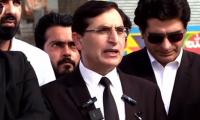Every year, when the Kashmir issue is raised at the UN General Assembly session, we start hoping that the time to resolve the dispute is fast approaching, even though the gap between optimism and reality has widened.
The issue was created by Lord Mountbatten who left no stone unturned to please Nehru at the time of Partition. As a result, Quaid-e-Azam spoke categorically about how Pakistan had been stabbed in the back by being “put on the wrong bus”. Over the decades, our rulers have failed to steer this bus in the right direction.
But the new government must at least be credited for devoting considerable time to the matter during the UNGA session. While addressing diplomats at the session, Foreign Minister Shah Mehmood Qureshi rightly pointed out that the unresolved Kashmir dispute remains a blot on the conscience of humanity. There can be no lasting peace in South Asia without settling this dispute. But we must first ask why the foreign speech’s speech has fallen on deaf ear.
The resonance of Qureshi’s words could still be heard when the UN Secretary-General Antonio Guterres embarked on a three-day visit to India. Given his long association with Islamabad, Guterres was considered to be a friend of Pakistan. After assuming office two years ago, he was offered to mediate between India and Pakistan twice.
However, before he landed in Delhi, Guterres declined an invitation from the Kashmir Centre for Social Development Studies to visit the conflict zone. He also gave a cold shoulder to the All-Parties Hurriyat Conference that tried to draw his attention to resolve the Kashmir dispute. Instead, he issued a vague statement through which he expressed his concern over the situation and encouraged a positive dialogue for “disagreements to be resolved peacefully”.
Guterres isn’t the first person to show this form of indifference. Kofi Annan, a former UN secretary-general, was the first to snub Pakistan during his visit to the region. Following in the footsteps of former US president George Bush, he decided against visiting Pakistan during his visit to India, Bangladesh, Nepal and the Philippines in 2008.
Till then, there had not been a single moment when a UN secretary-general selectively visited this sensitive region. Even three years before this incident, Annan had dashed all hopes of playing any role in implementing UN resolutions on Kashmir. During his visit to Islamabad after the devastating October 8, 2005 earthquake, Annan was asked if he had been biased in implementing resolutions in Iraq and not in Kashmir. Annan’s reply was realistic: “don’t compare apples with oranges”.
The UN Security Council had adopted 11 resolutions on Jammu and Kashmir between 1948 and 1957. Much to India’s displeasure, it remained a hot topic for discussion for over two decades as astute diplomats, like Sir Zafarullah Khan, advocated the cause. But the Simla Agreement between Zulfikar Ali Bhutto and Indira Gandhi, which was ratified under unfortunate circumstances after the fall of Dhaka, changed the overall dynamics.
A clause in the agreement that dealt with “settling differences through bilateral negotiations or by any other peaceful means mutually agreed upon between India and Pakistan” practically gave veto powers to New Delhi. Around 27 years later, the Lahore Declaration after the fateful Nawaz-Vajpayee summit endorsed this very agreement, leaving almost no space to manoeuvre. If we examine this tragic history, it is evident why every effort to globalise the issue has fallen on deaf ears.
The only way forward is a bilateral dialogue as we have tied the UN’s hands through the will of the aggressor. These bilateral dialogues should be facilitated by the international community as the status quo is in India’s favour. In this regard, the Foreign Office and UN mission should be lauded for arranging 50 or more interactions with our foreign minister in New York.
On the sidelines of the UNGA, Qureshi met with 22 foreign ministers, including those from Britain, Russia and China. Moscow, which once played a crucial role in bringing both warring countries to Tashkent, still has some influence on Delhi. However, as Pakistan resets its relationship with the US, it will merely be wishful thinking that Moscow will walk an extra mile on this front.
The only country that can bring both parties to the negotiating table is America. But Washington has its own vested interests in the region. Even resetting the relationship with the US administration can never mean that Indian Occupied Kashmir will fall into our lap like a ripe fruit. Yet, Islamabad can urge the US to help resume the dialogue process once elections are held in India. Till then, we should reflect on whether our 70-year-old rhetoric has taken us anywhere closer to resolving this dispute, and learn a lesson from the missed opportunities during the tenures of successive governments.
In this materialistic world, struggling economies only obtain compromised solutions. The other way is to take advantage of strategic moves that have a global impact. During Musharraf’s time, Pakistan had a comparatively better economy and some leverage due to the war on terror. Yet, what Musharraf could bargain for was a realistic solution rather than a just one. Imran Khan has inherited a poor economy and little space to manoeuvre. He is trying to turn the page in Pak-US relations while reviewing CPEC projects. In order to resuscitate the economy, Imran is offering everything at his disposal to Saudi Arabia.
Should the nation keep its fingers crossed as far as finding a solution to the Kashmir issue is concerned? Well, just watch the man steering the wheel of this bus closely and observe the direction he is heading towards. It won’t take long before you can find an answer to this question.
The writer is a senior journalistassociated with Geo News.
Email: nasim.haider@geo.tv
An aeroplane of the national flag carrier of Pakistan is seen in this file photo. — AFPWhile Pakistan considers...
Representational image of a graph depicting various variables. — APP/FileInitiated by the centre and fiercely...
In this picture taken on April 16, 2023, people throng a market area during shopping in Lahore. — AFPOne of the...
Honour crimes also target men. In Sikandar Ali Lashari vs The State, SHC upheld conviction passed by ATC for honour...
If Sindh earmarks Rs20 million per police station, it will cost only Rs10 billion to make them effective first...
A complex and difficult policy environment seems to be highlighted by US’s recent application of sanctions on...







